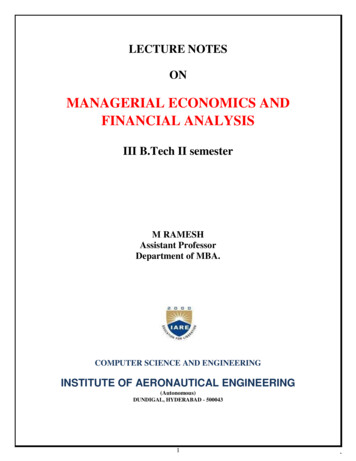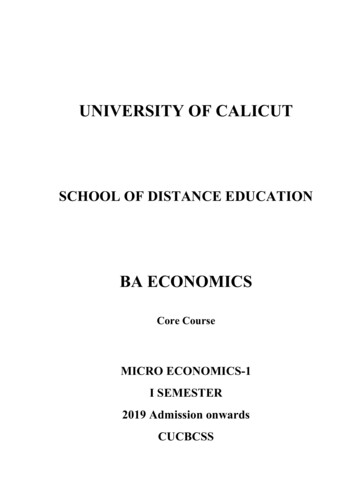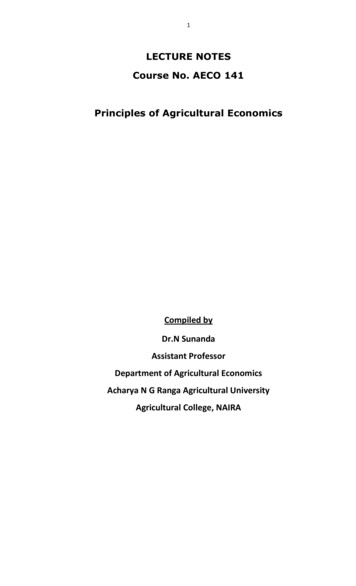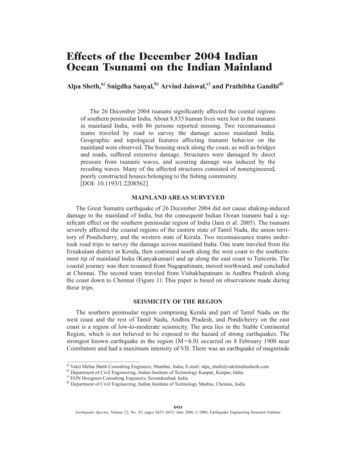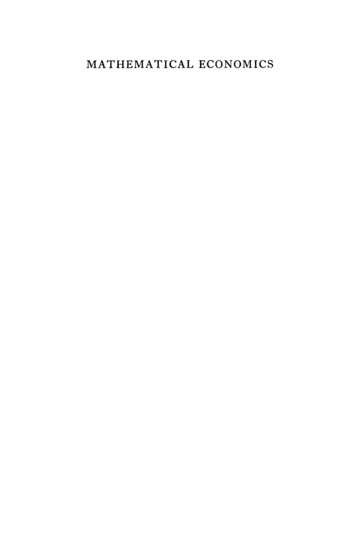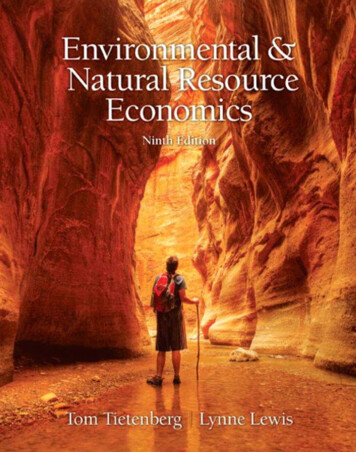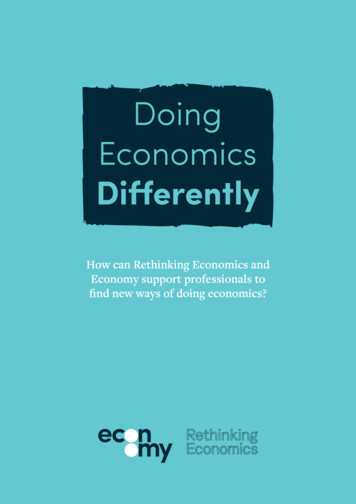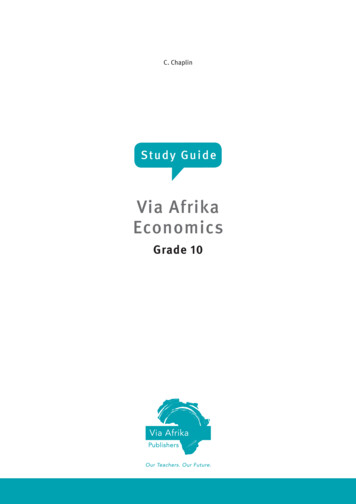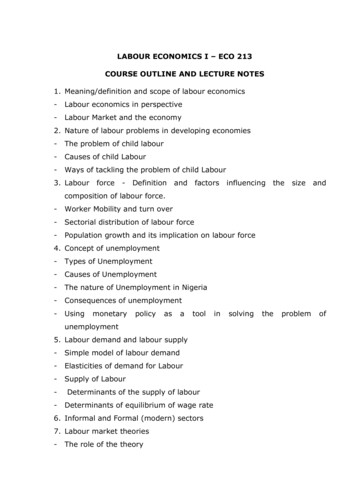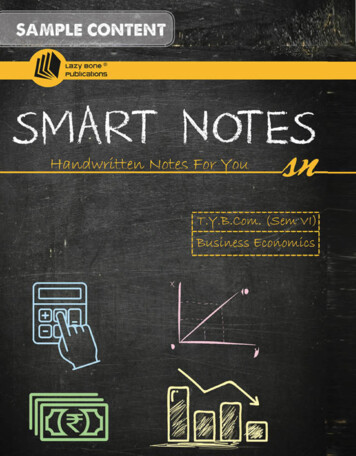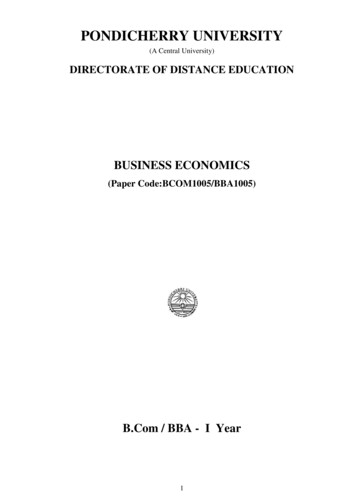
Transcription
PONDICHERRY UNIVERSITY(A Central University)DIRECTORATE OF DISTANCE EDUCATIONBUSINESS ECONOMICS(Paper Code:BCOM1005/BBA1005)B.Com / BBA - I Year1
Business EconomicsAuthors:Units I to VProf. M.S. Krishna MoorthyPrincipal (Rtd.)Tagore Arts CollegePuducherry – 605 008.Units V to VIIIDr. (Mrs.) N. VaralakshmiDept. of EconomicsK.M.C.P.G Studies,Tagore Arts College CampusPuducherry – 605 008.All rights reservedFor Private Circulation only.2
PAPER V - BUSINESS ECONOMICSUNIT IDefinition and Concept of Economics – Nature of Economic Laws – Methods ofEconomic Enquiry – Meaning of Micro and Macro Economics – Fundamental Concepts –Wants – Utility- Value - Wealth - Welfare.UNIT IIDemand Analysis – Meaning of Demand - Types of Demand – Determinants of Demand –Law of Demand – Types of Consumers – Marginal Utility Analysis – Elasticity ofDemand – Consumer’s Surplus.UNIT IIISupply Analysis – Meaning - Factors of Production - Land, Labour Capital andOrganisation – Law of Returns – Production Function – Return to Scale.UNIT IVCost and Output Analysis – Different Cost concepts – Marginal and Average Cost –Relationship – Long run and Short run cost curves – Revenue curves of firms.UNIT VPricing under Perfect competition – Monopoly – Monopolistic competition – Oligopoly –Price – Output – Determination in the Short run and Long run in the various Marketsituations.UNIT VIWages – Interest – Rent and Profit – Marginal Productivity – Theory of wages – RicardianTheory of Rent – Interest rate Theories.UNIT VIINational Income – Concepts – Measurement of National Income – Difficulties inMeasurement – Business Cycles – Various Phases – Important implications for Business –Appropriate Strategies and Policies both at the Macro and Micro Levels.UNIT VIIIGlobalisation – Implication to the Indian Economy – Theory of International Trade –Balance of Trade – Balance of Payments – Current Situation and Future Prospects.TEXT BOOK:Varshney R.L.& Maheswari, Managerial EconomicsREFERENCES:Joel Dean, Managerial EconomicsMithani and VSR.Murthy, Fundamentals of Business EconomicsReddy P.N and Appanniah H.R., Principles of Business EconomicsSundharam K.P.M and Sundharam E.N., Business Economics3
UNITIIITABLE OF CONTENTSLESSONTITLE1.1Concept of Economics1.2Economic Analysis1.3Fundamental Concepts2.1Demand Analysis2.2Consumer’s Equilibrium – Marginal Utility Analysis2.3Elasticity of DemandPAGE NO.514212638482.4Consumer’s Surplus623.13.23.34.14.2Supply AnalysisTheory of ProductionProduction FunctionCost and Output AnalysisRevenue Curves of Firms6980921161365.1Perfect Competition1505.2Monopoly1575.3Price Discrimination1625.4Monopolistic Competition1665.56.1OligopolyTheory of Distribution1711746.2Theory of Wages1806.3Theory of Interest1866.4Theory of Rent1956.5Theory of Profit201VII7.17.2National IncomeBusiness Cycles206212VIII8.18.2International TradeBalance of Payment and Balance of Trade219227IIIIVVVI4
UNIT-ILESSON – 1.1 CONCEPT OF ECONOMICSIntroduction – Subject matter of Economics – Division of Economics Definition –Natureand Significance of Business Economics.1.1.1 INTRODUCTIONKnowledge of economic science is essential for every citizen in a country as itsstudy endeavors to open up to all the material means of a refined and noble life. The roleplayed by economic conditions of a nation could be well appreciated by people who knoweconomics. The statesmen, the social scientists, the workers, the businessmen, and almostall in all walks of life should have knowledge of economics for their own betterment aswell as the improvement of the society and the economy. Thus the importance ofunderstanding economics which Paul Samuelson described as “the oldest of the arts, thenewest of the sciences, indeed the queen of the social sciences” should not beunderestimated.Economics, as a branch of knowledge, has assumed immense importance in themodern complex world, for knowledge of economic science is being more and moreapplied to solve problems like want, poverty, unemployment, inflation, depression,recession, stagflation, underdevelopment, adverse balance of trade and balance ofpayments, over population, food etc. in developed as well as less developed countries.Economics is applied scientifically and increasingly to business management andeconomic theory to business practice, thereby helping decision-making and forwardplanning in business organizations.1.1.2 SUBJECT MATTER OF ECONOMICSThe subject matter of such an important and useful branch of knowledge calledeconomics is quite obvious. Looking around us, we observe people performing manifoldactivities in different walks of life. They are all engaged in the “ordinary business of life”so to say. The farmer in his agricultural field, the shopkeeper in his shop counter, theteacher in the class room, the lawyer pleading in the court, the engineer in his work site,the doctor dispensing at the hospital, the scientist in his laboratory, the butcher in theslaughter-house, the acrobat in his circus. In short the multitude of human beings engagedin various forms of work and service are all employed either on their own or by others withthe objective of earning money. With the income so earned, they purchase goods and5
services which they need and thereby satisfy their wants. Thus ‘want’ is the starting pointof all economic activity. If wants are to be satisfied, efforts in different ways have to bemade with a view to earning income with which one can satisfy human wants. Wants leadto efforts which lead to satisfaction. As Bastiat observed in his hook “Harmonies ofPolitical Economy”, “Wants, efforts, satisfaction – this is the cycle of political economy”Wants Efforts Satisfaction. The existence of human wants is the driving force ofeconomic activity. The purpose of economic activity is the satisfaction of human wantsthrough efforts.1.1.3 DIVISIONS OF ECONOMICSSince ‘wants’ are the beginning point of economics, the first branch of economicstudies is concerned with human wants and their satisfaction. This branch is known as‘Consumption’, under which we study the character of human wants, the Determinants ofDemand, the Law of Demand, Elasticity of Demand, Consumers Surplus and the Analysisof Demand.In order to satisfy human wants, we must produce goods and services required. Ifconsumption is the end, production is the means. Hence we have the second branch ofeconomic studies called ‘Production’ under which come factors of production, size andeconomies of production, production function and the laws of returns. Herein, we studycosts of production, cost curves, supply and its elasticity, revenue curves, cost-revenuerelationship, etc.‘Exchange’ constitutes the third branch of economics which links producers withconsumers in the market for sale and purchase of commodities at prices differing withmarket forms and conditions. It comprises of pricing under perfect competition, monopoly,imperfect and monopolistic competition, oligopoly and so on. The study of exchange iscentral and crucial, for as Robert Dorman states: “An economy consists of producers andconsumers connected by markets in which they exchange goods and services at prices thatreflect both the desires of the consumers and the capabilities of the producers”.The fourth branch of economics known as ‘Distribution’ is concerned with what isto be distributed, among whom and according to what principle the sharing must beeffected. It deals with the theories, principles and practice of determining rent, wages,interest and profits. As production is the result of the combined efforts of four groups,namely the landlords supplying the land, the laborers supplying labor, the capitalists6
supplying enterprise, the values of the commodities produced will have to be dividedamong them as rent, wages, interest and profits respectively.The different branches of economics, stated above, are inter-connected with oneanother in the following manner.Consumers DemandProducers SupplyMarket PriceDistribution AmongLand (Rent)Labour (Wages)Capital (Interest)Organisation (Profits)‘Public Finance’ is the last branch of economics which encompasses the economicactivities of the state, the principles governing public expenditure, the ways by whichpublic revenue should be raised effectively, how public debt should be incurred and howthe fiscal deficit be covered and the like. There is an intimate connection between PublicFinance and the other four branches of economics. The way in which the state spends orraises revenue or covers a deficit exerts a great influence on the volume of production,distribution of income, consumption of goods and services etc.1.1.4 DEFINITION OF ECONOMICSAs the scope of economics is unlimited, an attempt at delimiting the scope ofeconomic science by defining it is not appreciated even by eminent economists. Prof.Gunnar Mydral, the Swedish economist, stated. “Definitions are both unnecessary andundesirable”. J. M. Keynes remarked, “political economy is said to have strangled itselfwith definitions”. Different economists defined economics differently from time to timemainly due to the fact that, as F.Zeuthen pointed out. “Economics is an unfinishedscience”. The passage of time has witnessed significant changes and remarkabledevelopments both in economic theory and practice and growing science like economicswhich is essentially a human and social science could not be delimited easily. Hence, Prof.Maurice Dobb was highly critical of the utility of any precise definition of economics andsaid that such attempt can only be barren, arid, scholastic dogmatism. In her view verysafely and clearly did Prof. Jacob Viner conclude by saying, “Economics is whateconomist does”. On the contrary, lack of clear-cut definitions would come in the way of7
the progress of a social science like economics. In the words of Eric Roll, “the definition isnot the idle pursuit of the pedant; it is an essential part of any systematic discipline”.FOUR STAGES IN DEFINING ECONOMICSThe problem of defining assumes immense importance because of multipledefinitions. Hence, for convenience, a detailed study of the definitions can be classifiedinto four distinct stages. The initial stage is represented by classical economist headed byAdam Smith who defined economics as the “science of wealth”. The next stage isrepresented by neo-classical economist led by Alfred Marshall who defined economics asa “science of material welfare”. The third stage was initiated by Lionel Robbins who gaverise to the widely accepted definition of economics as a “science of scarcity”. The presentday trend which is the fourth stage is set by Paul Samuelsson who gave a “growthoriented” definition of the subject and because of its applicability to all kinds ofeconomics-past, present and future as well as capitalist, socialist and mixed – it has auniversal appeal and therefore it holds the field as the most acclaimed and universallyacceptable definitions of economics.I.WEALTH DEFINITIONS: In the early days, economics was called the politicaleconomy because of the close relation between politics and economics. Adam smith, thefather of political economy, gave the title to his magnum opus as “an enquiry into thenature and causes of the wealth of nations”. According to classical economists, economicsis concerned with the earning and spending of wealth. They conceived of an economicman whom they described as a selfish, scheming and calculated individual ever engaged inmaking money. Their strong conviction was that human actions are spurred by selfishness.Through accepted for quite a long time, these definitions were condemnedby many for its deflects:1. These definitions are both narrow and incomplete as it includes onlygoods and excluding services from its purview. In fact the services ofteachers, engineers, doctors, cooks, dancers etc. are all wealth.2. Scholars like John Rushkin and Thomas Carlyle who were moralistswere shocked by the gospel of mammon worship preached by economicscience, and therefore, condemned it as a dismal science, as a science of“illith” rather than wealth.3. Many critics stated that wealth is not an end in itself and it is not the endall of economic activity.8
4. The concept of economic man created by classicists is merely a figmentof imaginations.5. They say that all actions of human beings are induced by sheerselfishness is clearly false.II. Welfare definitions: Dr. Alfred Marshall an eminent English economist defined thesubject as follows:“Political economy, or economics is a study of mankind in the ordinary business oflife; it examines that part of individual and social action which is most closely connectedwith the attainment and with the use of the material requisites of wellbeing. Thus it is onthe one side a study of wealth: and on the other and more important side, a part of thestudy man”. Following Marshall a number of neo classical economists defined economicsas a science or material welfare.Alfred Marshall was the first economist to lift the science of economist from themorass of disrepute into which it had fallen, due to its association with the study of wealth.Marshall’s shift of the emphasis from wealth is not an end itself. He described wealth asonly a means to an end and the end is the promotion of human welfare. Wealth wasrelegated to the background and man was placed in the fore front. Marshall’s attempt toglorify the study of economics, as an engine of social betterment was a welcome move.But Marshall’s definition has also been subjected to severe criticism on a numberof grounds. Lionel Robbins led a frontal attack on the definition and stated that “whatevereconomics is concerned with it is not concerned with the causes of material welfare assuch”.1. This definition has unduly restricted the scope of economics by unnecessarily layingemphasis on “material” things that would lie outside the ambit of economics. This is notthe reality as non-material things like the services of teachers, singers, etc. alsocontribute to our wellbeing and their study also lies within the scope of economics.2. All material things do not give welfare. Drinking liquor or consuming harmful drugs isnot good for our welfare. The use of narcotics and intoxicants, except for medicalpurposes is not conducive to human welfare. Yet the activities are related to production.Sale and distribution of such goods have to be studied by economists, since they fallunder the category of scarce goods which satisfy human wants. If economics were to beconcerned with the causes of material welfare, then we have to adjudge what willpromote welfare and what will lesson welfare. This would pave the way for economists9
to enter into the field of ethics and pass moral judgments on what ought to be and whatought not to be. But positive economists like Robbins deny that economics is anormative science. To Robbins, economics is neutral between ends and it is not foreconomists to prescribe what should be done and what should not be done, or what isgood and what is bad, or between just and unjust things.3. Yet another objection is on the very concept of welfare itself. Welfare is subjective andcannot be quantified. Welfare is an experience that cannot be measured precisely.Hence it is unscientific to lay the superstructure of economic science on sandy base likewelfare. Hence Robbins asks, “why talk of welfare at all; why not throw away the masktogether?”4. Robbins further criticized the Marshall’s definition as classificatory instead of beinganalytical. Marshall’s welfare definition which is concerned with group of activitiesrather than with “aspect” of activities is illogical, unscientific and defective. Robbin’sview is that only a particular aspect of activities should be studied in economics, i.e.,such activities which are undertaken because of scarcity.III.SCARCITY DEFINITION: Prof. Lionel Robinson of the London School ofEconomics wrote, in 1932, a book titled “the nature and significance of economicscience”, in which he constructed a new definition which runs as follows.“Economics is the science which studies human behavior as a relationship betweenends and scarce means which have alternative uses.” Three basic propositions are laiddown by this definition which are as follows:1. ‘Ends’ which refer to human wants are unlimited. There is no limit to our wantswhich keep on multiplying with the progress of civilization. But all of our wantsare not of equal importance or urgency for satisfying them. It is possible to preparea scale of preference for each and every person by grading wants on the basis oftheir urgency or intensity.2. The‘means’ which refer to available resources are quite limited. When wantsmultiple, the resources at the disposal of human beings like money, materials time,energy, etc. are relatively scarce, i.e., means are limited relative to their needs.10
3. The ‘means or resources can be put to alternative uses. If good can be put to only asingle use, there would arise no economic problem in its use. When the good hasbeen put to any other use arises there issues. But in actual life, it can be easilyobserved that a good is capable of being put to several alternative uses. Hence itstotal demand is so high that its existing supply is not adequate to meet it. Thus thegood concerned gains economic significance.From the three fundamental propositions stated above, it is evident that aneconomic problem arises only because all these conditions are not fulfilled simultaneously.Hence, there is need for “economic” use of resources. It is the problem of choice theresources. We have to choose between the more urgent and less urgent wants, and decidewhich wants should be satisfied first and which wants should be postponed for futuresatisfaction.Lionel Robbins demolished the Marshallian structure of economics based on“material welfare” and erected an altogether new edifice on two foundations namelymultiplicity of wants and scarcity of resources. This definition is scientific, analyticaluniversal, clear, general, precise and hence superior to earlier definitions.In spite of its scientific nature, Robbins’ definition was put to stringent criticism onthe following grounds:1. It is said that since wealth consist of economic goods (scarce goods), the wealthdefinition and scarcity definition are not very different.2. It is too wide as it creates a new ground for individual economics. Economics,being a social science, is relevant only in the context of social behavior.3. It is not as exact and scientific as it claims to be, because of the fact that“exchange”, “market process” and “pricing” are essential for the economic processrather than “scarcity” and “husbandry of resources”.4. To Robbins’ economics is nothing but a positive science. But many others feel thateconomics is also a normative science. It should not merely describe but alsoprescribe. The famous economist John Maynard Keynes stated that, “the theory ofeconomics does not furnish a body of rather than a doctrine, an apparatus of mind,a technique of thinking which helps its possessors to draw correct conclusions”.5. Robbins’ definition deals too much with “means” but almost very little with“ends”.11
6. It dehumanizes economics by reducing economics to equilibrium analysis.7. Macroeconomics falls outside the purview of Robbins’ definition and thus animportant branch is outside of its fold.IV. GROWTH ORIENTED DEFINITION: Paul A. Samuelson gave a definition ofeconomics which seeks to remove the defects in Robbins’ view. It includes the aspect ofeconomic growth and has the chief merit of taking cognizance of the dynamic changesoccurring in the “ends” as well as the “means” with the passage of time. According toSamuelson, “economics is the study of how men and society choose with or without theuse of money, to employ scarce productive resources which could have alternative uses toproduce various commodities over time , and distribute them for consumption now and inthe future among various people and groups of society”.This definition has included the element of time which has made it dynamic. Theproblem of growth in ends and means have now been included and hence the superiority ofthis definition over that of Robbins. This appears to be the most satisfactory and acceptabledefinition of economics.1.1.5 NATURE AND SIGNIFICANCE OF BUSINESS ECONOMICSThe terms “Economics for Business Decisions”, “Economic Analysis for BusinessDecisions”, “Economics of Business Management”, “Economics of the Enterprise”,“Economics of the firm”, “Business Economics” and “Managerial Economics” have allbeen used interchangeably. The use of economic tools to analyse situations, of economicreasoning to solve business problems, of economic theory to business practice has come tobe accepted by management or business executives in business organizations in their primefunctions of decisions making and forward planning.Decision-making is the process of choosing one among alternative courses ofaction and forward planning is the process of planning for the future. Since factors ofproduction like land, capital, labour and enterprise are scarce and they can be put toalternative uses. It is a question of choice or decision-making regarding the most efficientallocation of resources or inputs to attain the maximum output and the most effectivemeans of achieving the desired goal, say maximization of profits. Once choice of the goalto be achieved is made, then plans relating to inputs, output, pricing, etc. are drawn. Thusforward planning and decision-taking are simultaneously undertaken. Further, businesspeople are engaged in a continuous process of decision-making in an environment of12
uncertainty and change. In permitting the prime function of taking decisions in anuncertain environment, economic tools, theory and analysis can be best put into service.Input-output analysis, optimization techniques and linear programming have all becomepopular. Economic forecasting, demand forecasting, price forecasting, profit forecasting,etc. have come to use econometrics for formulating business policies.Self Assessment Questions1. State and assess the wealth definition of Economics.2. State and assess the welfare definition of Economics.3. How did Lionel Robbins give a new definition of Economics? Explain its content,merits and demerits.4. The growth–oriented definition of Economics is superior to that of others.Elucidate.5. Examine the nature and significance of business economics6. Distinguish between positive and normative economics.13
LESSON 1.2ECONOMIC ANALYSISIntroduction – Nature of Economic Laws – Methods of Economic Enquiry – Meaning ofMicro and Macro Economics.1.2.1 INTRODUCTIONEconomic analysis is concerned with how an economy works the formulation ofeconomic laws, the methods of economic enquiry and the different approaches toeconomics. Economic laws, unlike the exact laws of physical sciences, are more exact thanlaws of other social sciences. The two methods of economic enquiry namely deduction andinduction play a vital part in economic reasoning. The two branches of economic analysis,viz. 1) Micro-economics and 2) Macro-economic are two different approaches, the oneanalyzing small individual units of the economy microscopically, whereas the other looksat the economy as a whole and its large aggregates respectively. Each has its advocates,but now every economics student recognizes the importance and complementarily of both.1.2.2 NATURE OF ECONOMIC LAWSEvery science, natural or social, has its laws. These laws are generalizations buildupon the bases of facts, reasoning and scientific verification. In economic science also,there are many such laws. But, by their nature, economic laws are different from those ofphysical sciences like physics and chemistry.First of all, economic laws are hypothetical; they are valid with the qualifyingphrase “ceteris paribus” which means “other things being equal”. This condition qualifiesall economic laws. In actual life, other things seldom remain equal. But this does not deterthe validity of economic laws. All social sciences are under the necessity to make certainassumptions. To quote Alfred Marshall, “Economic laws or statements of economictendencies are those social laws which relate to branches of conduct in which the strengthof the motives chiefly concerned can be measured by a money price”. The implication ofthis definition is that given certain conditions, certain results are likely to occur. There isan element of uncertainty about them. For instance, the Law of Demand states that, if pricerises, the demand for the commodity will contract. This is true and the law is quite valid,only when counteracting forces do not operate. Hence we say that economic laws aremerely statements of tendencies. The hypothetical natures of economic laws contradictwith laws of natural sciences due to the following reasons:14
1. Economic laws are concerned with human behavior which is subject to emotions,impulses and feelings.2. Time factor also makes for the hypothetical nature of economic laws. With thepassage of time, conditions change, so also economic laws. However, economiclaws are more exact than other social laws, because economic science makes use ofthe “measuring rod of money”. To Marshall, the laws of economics are to becompared with the laws of tides rather than with the simple and exact law ofgravitation. Economic laws, like tides, lack predictability and exactness.3. Lionel Robbins, however, did not subscribe to this narrow view and broadened thescope of economic laws. Whether any objective or conduct of man is concernedwith money or not is immaterial; still, it will fall within the ambit of economiclaws, if it is involving the problem of choice, i.e., allocation of limited meansamong competing ends. In the view of Lionel Robbins, economic laws arestatements of tendencies which govern human behavior relating to the use of scarcemeans for the achievement of unlimited wants.4. Economic laws are not permanent, general and everlasting because they are framedin a particular social and institutional set-up. When the set-up itself changes, nolonger the established law will remain relevant. Economic laws will undergochange with the evolution of economic life of man and transformation in theinstitutional set-up. Thus, economic laws applying to hunting and pastoral stagesdid not make sense in the agricultural and industrial stages. Economic laws framedin the contest of capitalistic institutional set-up may not apply to the socialistcountries. Laws of economics, valid for developed economies, may fail to apply toless developed countries because different conditions and factors obtain in thesecountries. Economic laws are not statutory commands or moral laws or evencustomary laws. They are merely in the indicative mood and not in the imperativemood.1.2.3 METHODS OF ECONOMIC ANALYSISAs in the case of every other science, so in the field of economic analysis, there aretwo important methods useful for investigation and formulation of its principles, laws,generalizations or theorems. They are deductive method and inductive method. The issueof whether deductive method is preferable to inductive method or vice verse was a ragingcontroversy in the 19th century. The English classical economists like David Ricardo,T.R.Malthus, John Stuart Mill and Nassau Senior were solid advocates of deductivemethodology.Deductive Method:The deductive method is also called the abstract, analytical or a priori method. Inthis method, we start from a few indispensable facts and after making certain assumptions,15
through logical reasoning, certain conclusion are reached. It consists of three importantstages, namely (i) observation, (ii) logical reasoning, and (iii) inference and testing bymeans of further observations. Deductive reasoning provides us with hypothesis which aretested and verified with relevance to facts and figures and then we draw valid economiclaws.In economics, we start with simple premises and step by step work up to morecomplex and refined hypothesis. In this method, we descend from the general to theparticular.The following merits are found in the deductive method;1. It is simple and logical2. It does away with the need for experimentation.3. It leads to accuracy in generalization due to logical reasoningHowever, there are certain defects:1. If assumptions made are wrong, generalizations made on the basis of wrongassumptions will also be invalid.2. There is too much abstraction and economists through their intellectual exercisegive rise to only “intellectual toys” without any reality.3. Generalizations of deduction based on wrong premises may become dangerous anddisastrous results will follow when governments frame policies on such premises.InductionMethod:The inductive method is also known as the empirical method. It derives economicgeneralizations based on experience and observations. In this, data are collected withreference to certain economic phenomena and finally generalizations are derived from thecollected data and observations. Here, we mount from the particular to the general. Fromobservations we build up through reasoning founded on experience, to formulategeneralizations based on observed data. The historical school of Germany represented byCarl Knies, Hildebrand, Prof.Roscher and Von Thunen were strong and staunch supportersof the inductive method. It should however, be emphasized that the division of opinionbetween the two schools of thought was neither complete nor clear-cut.In the inductive method, economic scientists proceed from a particular angle toscientific problems to bridge the gap between theory and practice. Induction is done byeither experimentation or the statistical approach and these are the two forms of induction.16
Experimentation has larger scope in the physical sciences and whereas the statisticalapproach in social sciences like economics. The fam
Demand, the Law of Demand, Elasticity of Demand, Consumers Surplus and the Analysis of Demand. In order to satisfy human wants, we must produce goods and services required. If consumption is the end, production is the means. Hence we have the second branch of economic studies called 'Production' under which come factors of production, size and

